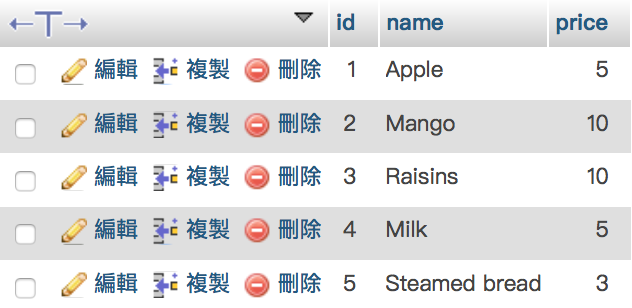# IOS 原生 vs Alamofire+SwiftyJSON
# Database data
- id : Int
- name : String
- price: Int

# Food.swift
class Food: NSObject {
var id: Int
var name: String
var price: Int
init(id: Int, name: String, price: Int) {
self.id = id
self.name = name
self.price = price
}
}
# 不用任何第三方庫做法
class ViewController: UIViewController {
override func viewDidLoad() {
super.viewDidLoad()
var foodList : [Food] = []
//https://code.bradymower.com/swift-3-apis-network-requests-json-getting-the-data-4aaae8a5efc0
//Example 5
let config = URLSessionConfiguration.default
let session = URLSession(configuration: config)
let url = URL(string: "http://www.wingnashk.synology.me/php/getFoodData.php")!
//拎資料
let task = session.dataTask(with: url) { (data, response, error) in
//如果statusCode != 200 代表有問題 -> 不執行下面的code
guard ((response as! HTTPURLResponse).statusCode == 200) else {
return
}
if error != nil {
print("error: ", error!.localizedDescription)
} else {
if let data = data{
//Data -> json -> array
let json_array : [[String : AnyObject]] =
try! JSONSerialization.jsonObject(with: data,
options: .allowFragments) as! [[String : AnyObject]]
//[json] -> [Food]
for foodInfo in json_array {
let food : Food = Food(id: foodInfo["id"]! as! Int,
name: foodInfo["name"]! as! String,
price: foodInfo["price"]! as! Int)
foodList.append(food)
}
for food in foodList {
print("id: \(food.id)")
print("name: \(food.name)")
print("price: $\(food.id)")
print("---------")
}
}
}
}
//async
task.resume()
}
override func didReceiveMemoryWarning() {
super.didReceiveMemoryWarning()
}
}
可以看到一些不太明白的code 例如
URLSessionConfiguration.defaultURLSession(configuration: config)很多強制轉換的情況 例如as! [[String : AnyObject]]as! String可讀性差
# Alamofire+SwiftyJSON做法
class ViewController: UIViewController {
override func viewDidLoad() {
super.viewDidLoad()
var foodList : [Food] = []
Alamofire.request("http://www.wingnashk.synology.me/php/getFoodData.php").responseJSON { response in
//如果 result fail (!= 200)代表有問題 (可自定義)-> 不執行下面的code
guard (response.result.isSuccess) else {
return
}
if let data = response.result.value {
//data -> json
let json = JSON(data)
//json -> array
for (_,subJson):(String, JSON) in json {
let food : Food = Food(id: subJson["id"].int!,
name: subJson["name"].string!,
price: subJson["price"].int!)
foodList.append(food)
}
for food in foodList {
print("id: \(food.id)")
print("name: \(food.name)")
print("price: $\(food.id)")
print("---------")
}
}
}
}
override func didReceiveMemoryWarning() {
super.didReceiveMemoryWarning()
}
}
相比原生的做法 Alamofire大大簡化了網絡請求的操作 例如不用理會
URLSessionConfigurationURLSessionSwiftyJSON配合Alamofire使用,令解析json變得更簡單 可讀性高
贊助商連結